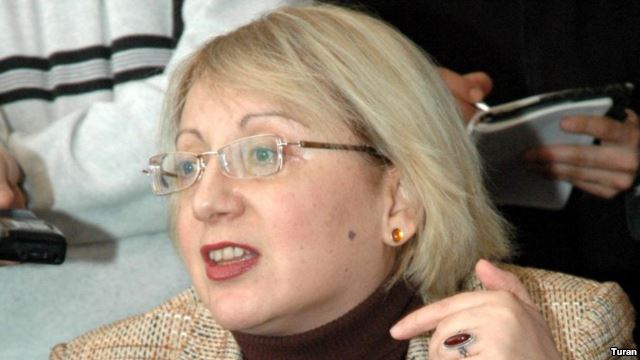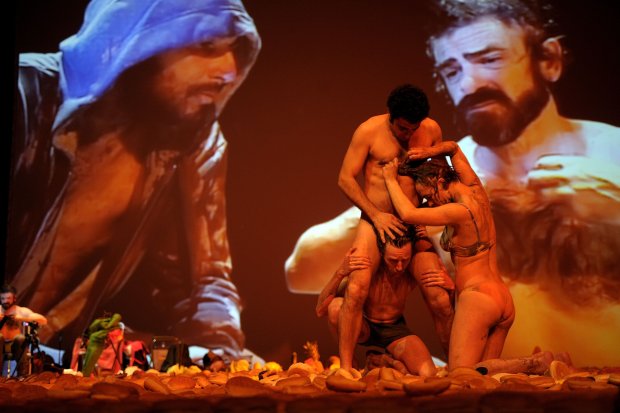30 Jul 2014 | Azerbaijan, Azerbaijan News, News and features

UPDATE 30 July 17:30 pm
Leyla Yunus has been charged with “high treason (article 274), tax evasion (article 213), illegal entrepreneurship (article 192), forged documentation (article 320) and fraud (article 178.3.2)”, reports Meydan TV. She has also been given three months of pre-trial detention, according to Azerbaijani journalist Khadija Ismayilova. Her husband Arif Yunus is reportedly facing two charges; state betrayal (article 274) and fraud.
—
Azerbaijani human rights activist Leyla Yunus has been taken to the prosecutor’s office in Baku for questioning, local media reported.
While on her way to a conference this morning, three men entered her taxi and confiscated her and her driver’s mobile phones. According to her husband Arif Yunus, she is not allowed to see her lawyer.
“It is likely [they] are going to try and arrest her as part of Mirkadirov’s case. It is also likely I too will be arrested,” he told BBC Azerbaijan. He was referring to the case of journalist Rauf Mirkadirov, who was arrested in April and charged with espionage, believed to be linked to his contact with Armenian civil society. Leyla Yunus has spoken out in support of him. Mr. Yunus also said people were trying to break into the couple’s apartment this morning.
Leyla Yunus is the director of the Peace and Democracy Institute, which among other things works to establish rule of law in Azerbaijan. She has previously been targeted by authorities, including in April, when she and her husband were detained when trying to board a flight from Baku to Doha, Qatar. Azerbaijan has a notably poor record on human rights and civil liberties. According to recent figures, there are a 142 political prisoners in the country.
This article was posted on July 30, 2014 at indexoncensorship.org
30 Jul 2014 | Azerbaijan, Azerbaijan News, News and features

Human rights defender Leyla Yunus was detained today in Baku.
It does not take a lot of time and effort to see that when it comes to Azerbaijan, views on the country’s freedom of expression record split in two. One–belonging to the president and his cronies–and their limited vision of reality combined with their persistent disregard of truth. And the other–the disregarded citizens–whose life is like an ongoing challenge full of obstacles–arrests, intimidation, murder, detention, beatings and blackmail to name a few. The levels of this marathon get harder to win and even then, there is a price to pay, sooner or later.
Stellar record vs stark reality
President Ilham Aliyev of Azerbaijan says, “All fundamental freedoms are guaranteed in Azerbaijan. There are free media and free internet”. International advocates of free speech and their Azerbaijani supporters claim otherwise. Azerbaijan ranks 160th on the World Press Freedom Index; 183rd on the Freedom House Press Freedom Index; and “partly free” on Freedom on the Net report. The list only goes on.
Currently there are at least ten journalists in detention or prison serving long and heavy sentences. There are five bloggers, 8 youth activists and civil society representatives similarly in jail on trumped up charges. According to Amnesty International in 2013, there were at least 19 prisoners of conscience behind bars in Azerbaijan. Just today, human rights defender Leyla Yunus was detained in Baku.
And if the end result of a certain type of work/affiliation/statement/ or action isn’t necessarily time spent in jail, people are often threatened, intimidated, and even blackmailed- the list of “punishments” is creative and has no limits.
One of the country’s prominent investigative journalists, Khadija Ismayil had her share of a punishment for digging out the truth. In March of 2012, Ismayil received a package where not only was she sent a letter full of belittlement and blasphemy but also a video tape of intimate nature of her personal life.
More recently the head of a local NGO from Ganja, Hasan Huseynli was sentenced to six years in jail for allegedly stabbing a man on the street.
Only days following sentencing of Huseynli, two more young men and brothers Faraj and Siraj Kerimli were detained (Faraj was in fact kidnapped) and currently are held in pretrial detention for yet another trumped up charge–drugs possession and promotion of psychedelics via social networks.
There is free media and free speech only if its pro-government media and speech. Most of the working printed papers are either government sponsored, supported, or have cut a deal of some kind.
The internet is the remaining platform for free speech and even online there is surveillance and control. Some independent online outlets have been subject to attacks while users of social media tools are shown their correspondence on Facebook when detained for questioning.
And so the government continues to play the game of cat and mouse while disguising its dismal record of free speech and human rights under the pretext of being a young democracy, in conflict with a neighboring country, and thus occupied by far more pressing issues than addressing biased reports of international organizations on poor record of human rights and free speech.
Index Reports: Locking up free expression: Azerbaijan silences critical voices (Oct 2013) | Running Scared: Azerbaijan’s silenced voices (Mar 2012)
This article was published on July 30, 2014 at indexoncensorship.org
30 Jul 2014 | News and features, Poland, Religion and Culture

Golgota Picnic was pulled from a the Malta Festival in Poland after religious groups leveled threats.
The Polish theatre scene has been rocked by controversy since late June after the cancellation of Golgota Picnic, a show by the Argentinian theatre maker Rodrigo Garcìa that had previously aroused protest in France.
The play’s supposedly blasphemous content meant that Michał Merczyński, director of the Malta Festival, had pulled the headline show of his festival a week before its scheduled performance. The Malta Festival in Poznań is Poland’s answer to the Edinburgh Festival, and I was visiting with other directors from the Young Vic to learn more about Polish theatre culture. Our experience of the festival was derailed by claims and counter claims of blasphemy and censorship.
Merczyński’s decision to pull the show was based on information that a protest of 50,000 was planned and advice from the police that they could not guarantee the safety of the audience or the performers. The festival’s decision enraged large parts of secular Poland’s cultural elite, who feared that the police warning represented the state’s acquiescence to unofficial censorship by a group of interests centred upon the increasingly powerful Catholic church.
In reaction to the cancellation, there was a proliferation of protest screenings and staged readings of Golgota Picnic in theatres across Poland, some of which were variously picketed by a loose coalition of Catholics, neo-nazis and football hooligans. At the protest screening my group attended, at TR Warzsawa in Warsaw, these three groups all appeared to be embarrassed by each other. They prayed together and held placards warning that “Poland, motherland of Saint John-Paul II must not be a latrine for the trashes of the blasphemer, of the scoffers, of the traitors, of the barbarian and pseudo-artists”.
The Young Vic directors were jostled as we attempted to get in to the theatre and through the double cordon — first the protesters trying to stop us getting into the theatre, and then the police holding back the protesters. In the end we climbed over a low fence around a corner to get in and the police quickly bundled us into the building.
It’s important to say that this was much more exciting than it was scary. Here was evidence that theatre matters: people threatening hostility, if not quite violence, in response to an artwork. As far as I could make out from the DVD, Golgota Picnic (screened in Spanish with Polish subtitles) was a considered and beautiful meditation on the body and on Christ’s body in particular. Although it included a scene where a woman playing Jesus sculpted her gelled hair over another person’s genitalia, I’ve certainly seen more blasphemous plays. The crowd outside were fairly audible in their hymns and their chants, but — in the end, the protesters were defeated by the length of a piece of theatre. When we emerged two and a half hours later, they had given up and gone home.
The cancellation of Golgota Picnic left the Malta Festival deflated, but it felt as if these protests might be a powerful shot in the arm for Polish theatre culture in general. Several people we met were excited by the possibilities of the networks created and issues raised in the fight against religious censorship. Polish theatre provided a central political role in the end years of communism, and then lost its way only to be reinvented at the end of the nineties as a means to interrogate more universal themes in the formally explosive theatre of Gzegorz Jarzyna, Krzystof Warlikowski and Jan Klata, directors who still dominate the scene. It appears that Polish theatre is ripe for a new generation to redefine what theatre means.
As an outsider, this culture war looked complex and unhappy. Of course I was inside the theatre rather than on the street with a rosary, but it was clear that all the theatre people we met were well educated and well heeled. The Catholic protesters were not, and they felt like a demographic who had been left behind by the neo-liberalism that has replaced communism. It’s hardly surprising that these people are angry to see that “they are mocking us”, as one man complained to us on the steps of TR Warszawa.
It’s worrying to encounter theatre censorship in the EU, and artists should be free to present their work. At the same time, theatre institutions have a responsibility to ensure each piece of work finds its audience in the most productive way possible. With Golgota Picnic, the Malta Festival imported a show that had already caused protests elsewhere. Their marketing presented it as sexily controversial, and when this spectacularly backfired they cancelled the performance. Artists should shock and offend, but theatre makers and producers have to tread thoughtfully to ensure that the presentation of powerful work doesn’t play into the hands of those who would censor it.
Jeff James’s visit to Poland was supported by the Adam Mickiewicz Institute, the Young Vic and the Jerwood Charitable Foundation.
This article was posted on July 30, 2014 at indexoncensorship.org
30 Jul 2014 | Europe and Central Asia, European Union, News and features, United Kingdom

The British House of Lords has slammed the recent “right to be forgotten” ruling by the court of justice of the European Union, deeming it “unworkable” and “wrong in principle”.
The Lords’ Home Affairs, Health and Education EU Sub-Committee stated in a report on the ruling, published Wednesday, that: “It ignores the effect on smaller search engines which, unlike Google, may not have the resources to consider individually large numbers of requests for the deletion of links.”
The committee added that: “It is wrong in principle to leave to search engines the task of deciding many thousands of individual cases against criteria as vague as ‘particular reasons, such as the role played by the data subject in public life’. We emphasise again the likelihood that different search engines would come to different and conflicting conclusions on a request for deletion of links.”
The ruling from May this year forces search engines, like Google, to remove links to articles found to be outdated or irrelevant at the request of individuals, even if the information in them is true and factual and without the original source material being altered. Following this, Google introduced a removal form which received some 70,000 requests within two months.
The Lords committee recommends, among other things, that the “government should persevere in their stated intention of ensuring that the Regulation no longer includes any provision on the lines of the Commission’s ‘right to be forgotten'”.
Index on Censorship has repeatedly spoken out against the ruling, stating that it “violates the fundamental principles of freedom of expression“, is “a retrograde move that misunderstands the role and responsibility of search engines and the wider internet” and “a blunt instrument ruling that opens the door for widespread censorship and the whitewashing of the past”.
This article was posted on July 30, 2014 at indexoncensorship.org



